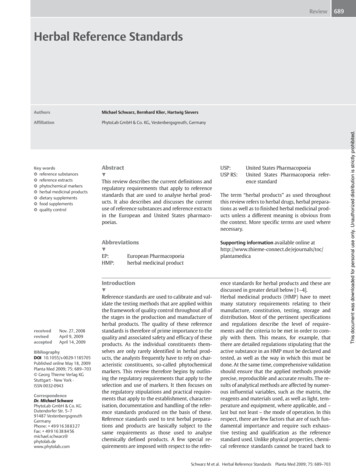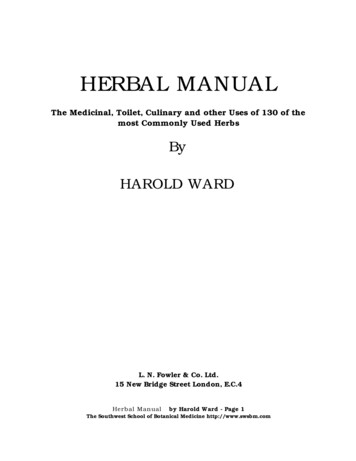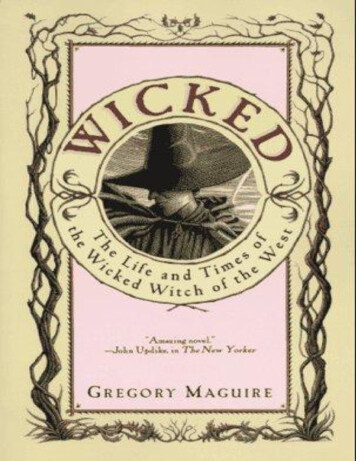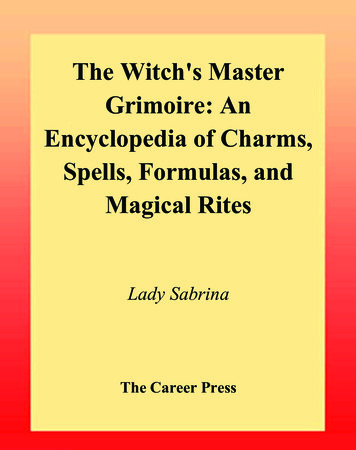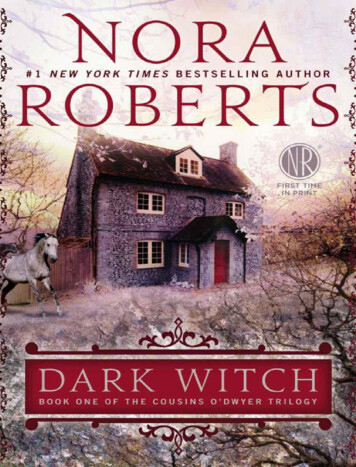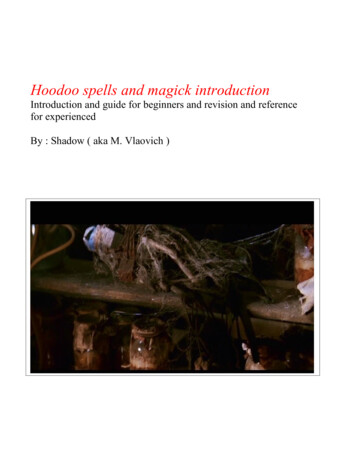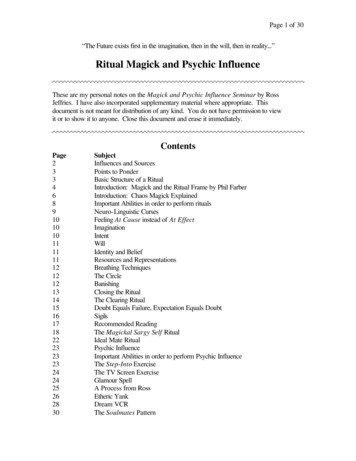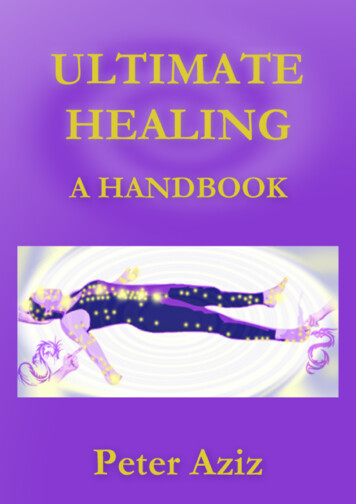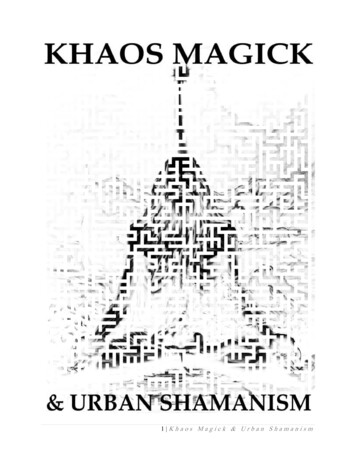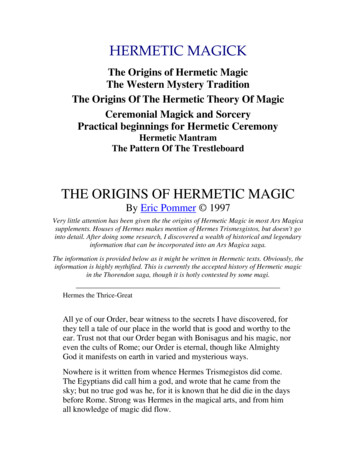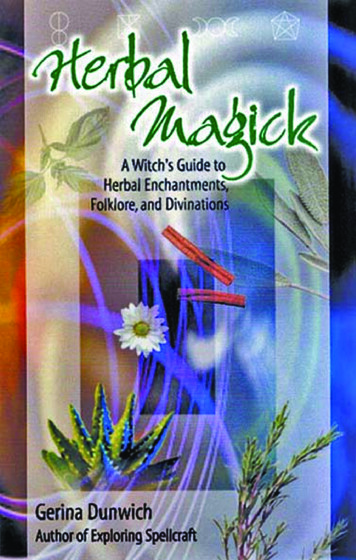
Transcription
HerbalMagickA Witch’s Guide to HerbalFolklore and Enchantments
HerbalMagickA Witch’s Guide to HerbalFolklore and EnchantmentsByGerina DunwichNEW PAGE BOOKSA division of The Career Press, Inc.Franklin Lakes, NJ
Copyright 2002 by Gerina DunwichAll rights reserved under the Pan-American and International CopyrightConventions. This book may not be reproduced, in whole or in part, inany form or by any means electronic or mechanical, including photocopying, recording, or by any information storage and retrieval systemnow known or hereafter invented, without written permission from thepublisher, The Career Press.Herbal MagickEdited and typeset by Nicole DeFeliceCover design by Visual GroupPrinted in the U.S.A. by Book-mart PressTo order this title, please call toll-free 1-800-CAREER-1 (NJ and Canada:201-848-0310) to order using VISA or MasterCard, or for further information on books from Career Press.The Career Press, Inc., 3 Tice Road, PO Box 687,Franklin Lakes, NJ 07417www.careerpress.comwww newpagebooks.comLibrary of Congress Cataloging-in-Publication DataDunwich, Gerina.Herbal magick : a witch’s guide to herbal folklore and enchantments /by Gerina Dunwich.p. cm.Includes bibliographical references and index.ISBN 1-56414-575 (pbk.)1. Witchcraft. 2. Herbs—Miscellanea. I. Title.BF1572.P43 D85 2002133.4’3—dc212001044650
Also by Gerina Dunwich:Candlelight SpellsThe Magick of Candleburning{republished as Wicca Candle Magick}The Concise Lexicon of the OccultCircle of ShadowsWicca CraftThe Secrets of Love Magick{republished as Wicca Love Spells}The Wicca Book of DaysThe Wicca GardenThe Wicca Source BookThe Wicca Source Book {Revised Second Edition}The Modern Witch’s Complete Source BookEveryday WiccaA Wiccan’s Guide to Prophecy and Divination{republished as The Wiccan’s Dictionary ofProphecy and Omens}Wicca A to ZMagick PotionsYour Magickal CatThe Pagan Book of HalloweenExploring SpellcraftThe Cauldron of Dreams
r1Pagan Herb Lore.17hChapter2Herbal Superstitions A to Z.35hChapter3Herbal ing by Root and Flower.69hChapter6Herbs of the Ancient Sorcerers.79hChapter7Hoodoo Herbs.85
hChapter8Gypsy Herb Magick.91hChapter9Magick in Bloom.99Chapter100hA Garden of Dreams.115hChapter111Herbal Correspondences.139hChapter122Where to Buy Magickal Herbs.187hChapter133Gods and Goddesses.195p ndAppendixA Calendar of Magickal Herb Lore.213“Elementale e t l Magick”MaMagick”.227Ma i k”b i ra pBibliography.229dxIndex.233t AuthoruuttAuthor.239Aboutb u the
ForewordI am often asked during interviews if I am a “White Witch”or a “Black Witch,” which has always brought to mind Glindaasking Dorothy is she is “a good Witch or a bad Witch” in TheWizard of Oz. I always reply that if I had to attach a color tomyself as a Witch, it would be “Gray.” Like Wiccans, I also tryto work my spells for the good of others and I seek to harmnone. Being a Witch who is rather well known throughout theworld due to my numerous published works, I am occasionally approached by individuals seeking to have an enemy ortwo done away with through magickal means. There was oneman from Russia who went as far as to mail me a letter, signedin his own blood, promising to pay me 1000 if I would cursehis son’s wife to have a miscarriage simply because he disapproved of his son marrying outside of the family’s orthodoxreligion! Despite my being offered some generous amounts ofmoney and expensive gifts in exchange for such services, I havealways refused and will continue to do so. I do not believe inusing magick for the purpose of doing harm to others, exceptin extreme cases where it is absolutely necessary for one’s ownself-defense or survival.I firmly believe in magickal self-defense and the teachingof lessons (for the good of others, of course) when they are 9
10Herbal Magickneeded, or when all else fails. If someone tries to inflict harmupon my loved ones or me, I will not hesitate to work mymagick to bind or bring down a hex upon them. And if someone dispatches a curse to me, I do not turn the other cheek ortake the attitude of “let the gods deal with it.” I send it rightback to the sender. Those are my personal set of ethics. Youmay or may not agree with them, which is fine in either case,but I will neither compromise or hide what I believe in for themere sake of being “politically correct.”The casting of spells involves working with powerful (andoften dangerous) magickal energies and is by no means something that should be undertaken by an untrained novice.Whenever working with energies, you should always take careto protect yourself the best you can through the use of magickcircles, amulets, talismans, and so forth. You should also bewarned that, despite your magickal knowledge and your bestefforts, the possibility of any kind of a spell backfiring alwaysexists. This is not an uncommon thing to have happen, andmany of the practitioners that I know, including myself, haveexperienced it at least once. It has nothing to do with karma,displeased gods, or Gerald Gardner’s threefold law, despitewhat some people choose, or are led, to believe. It has everything to do with the instability of magickal energy and/or apractitioner’s incorrect application of it.Within this book you will discover the magickal history ofherbs and learn how different Pagan traditions have employedcertain plants in their magickal workings and religious rites.Without question, some of the spells contained herein mightbe viewed as falling within the parameters of what is popularlyreferred to as “gray,” or possibly even “black” magick. However, it is important to remember that the majority of thesespells were either borrowed from, or inspired by, a number ofcenturies-old magickal traditions unrelated to the relativelymodern religious movement known as Wicca.
Foreword11Should you find yourself feeling uneasy about performingany of the spells in this book, you should not hesitate to modifythem to suit your particular needs, tradition, ethics, and soforth. Provided that you do not alter any of its basic correspondences, a spell can often be changed without altering itspurpose or rendering it completely useless. In fact, I have always been a firm believer that the more you personalize a spell,the better results it will yield for you.Your other option, obviously, is to simply not use a particular spell that you feel uneasy with or not drawn to. Thechoice is up to you. However, where ethics lie, I will not decide for you what is right and what is wrong. But I will try topresent the pros and cons as honestly and completely as I canso you can make an informed decision for yourself.With all that being said, it should also be noted here thatnearly all Wiccans are strongly opposed to the use of magick(in any form) to manipulate the free will of others, and especially to bring down curses. Although I am not a Wiccan myself, I respect those who adhere to their Wiccan Rede of“harming none.” However, I am one Witch who does not passjudgment against my fellow practitioners who may employthe darker forces of magick when they feel that it is absolutelya necessity.
IntroductionThroughout history and throughout the world, herbs haveplayed a major role in magick, religion, superstition, and divination, as well as in the development of humankind.Witches and Pagan folk the world over have held a specialrelationship with herbs since the days of antiquity. Developingvarious methods to harness the magickal energies contained withinflowers, leaves, roots, and bark, they have used them as tools forhealing, divination, spellcrafting, and connecting with Deity.The ancients believed that all herbs possessed a spirit, or,as in the case of many poisonous or mind-altering plants, ademon. Nearly every culture has recognized the occult vibrations of herbs, and attributed certain magickal properties totheir native plants and trees.It is said in the Magic and Medicine of Plants (Reader’sDigest), “Our distant ancestors did not need to be trainedbotanists to observe and appreciate the remarkable energy anddiversity of the plant world.”Early civilizations sought to harness and direct the magickalpowers of plants for curing diseases, warding off misfortune,divining the future, and appeasing the gods. In ancient Egypt,a land that has been described as “an ideal breeding ground”for magickal herbalism, plants such as the lotus, the papyrus 13
14Herbal Magickreed, and the onion (which was often presented as a sacrificialoffering to the gods) were greatly revered and believed to possess spiritual virtues.Despite the fact that myrrh trees were not native to Egypt,myrrh played a vital role in the religious and magickal ceremonies of the ancient Egyptians. The fragrant aroma produced by the burning of myrrh was believed to be pleasing tothe gods. Myrrh was burned every day at the midday hour asan offering to the sun god Ra, and was also fumed in the templeswhere the goddess Isis was worshipped.The people of ancient Greece and Rome linked their native trees and plants to the gods and goddesses of their pantheons. In the old Greek and Roman religions, plant mythsfigured predominantly. Tales of mortals and gods alike beingtransformed into trees were common, and nearly every deitywas known to have held one or more tree and/or plant as asacred symbol.Historically, belief in the magickal properties of plants wasby no means restricted only to Pagans and pre-Christian religions. Numerous references to herbal magick and botanomancy(the art and practice of divination by plants) can be foundthroughout the Bible, from the burning bush oracle of Moses,to Rachel’s use of mandrake roots to magickally increase herfertility, to Jacob’s magickal use of striped poplar, almond, andplane-tree rods to bring forth striped, speckled, and spottedlivestock offspring.During the Middle Ages, Witches (or, perhaps more accurately, women and men who were accused of being Witches)were believed to have employed a wide variety of plants tobring about evil, as well as to do good if they so desired. Thosewho made use of poisonous plants such as hemlock and henbane to lay curses or cause mischief were labeled “BlackWitches.” Those who applied their herbal wisdom for the benefit
Introduction15of others (such as for healing or working love magick) earnedfor themselves the reputation of a “White Witch” (which wasequated to being a good Witch.) Those who were “WhiteWitches” were far more respected in most circles than their“Black” counterparts. But of course not all Witches were exclusively “White” or “Black.” Those who practiced a little bitof both were said to be “Gray.”However, as a charge of Witchcraft (regardless of its “color”)oftentimes resulted in a death sentence preceded by the mostheinous acts of torture, wise Witches of old needed to carefully practice their craft veiled behind the shadows of secrecy.A great deal of what little botanical witch lore remains fromcenturies past is contained in the transcripts of the Witchcrafttrials that took place during the Burning Times. “From suchsources,” observe the editors of Magic and Medicine of Plants,“we gather that witches were heirs to ancient lessons about themedicinal properties of many substances found in nature. TheWitches preserved and continued to use plant lore that theChristian church had suppressed as ‘heathen’ mysteries.”In the United States, magickal herbalism is largely rootedin European botanical lore brought across the Atlantic by immigrants from distant lands, and influenced to varying degrees by Native American herb lore and the plant magickpracticed by African slaves.In contemporary times, as it has been in the past, herbalmagick remains an essential part of the Witches’ craft. It canbe used to assist an individual in attracting a compatible lover,landing the right job, changing bad luck into good, and evenincreasing one’s wealth! Empowered by the energies of Goddess Earth and her elementals, herbs have long been used asamulets to protect against evil, dried and burned as magickalincense during rituals, and added to flying ointments and cauldron brews.
16Herbal MagickHerbs can be used to cure or to curse, as well as to conjureor to banish supernatural entities. They can enchant our gardens and our homes, and guide us on the path to transformation and self-improvement. But, most importantly, herbalmagick can open the door to spiritual realms and other worlds,and serve to connect a human being with Mother Nature andthe Divine.There probably exists no plant or tree that hasn’t at onetime, in some part of the world, been used in a spell or potion,or utilized as an amulet. And it is said that all parts of a plant,whether they be roots, buds, flowers, stems, or bark, aremagickally significant.Herbs are Mother Nature’s gifts to all of humankind, regardless of spiritual beliefs, magic
Gypsy Herb Magick.91 Chapter 9h 9 Magick in Bloom.99 Chapter 10h 0hChapter 10 . spells were either borrowed from, or inspired by, a number of centuries-old magickal traditions unrelated to the relatively modern religious movement known as Wicca. Foreword 11 Should you find yourself feeling uneasy about performing any of the spells in this book, you should not hesitate to modify them .

